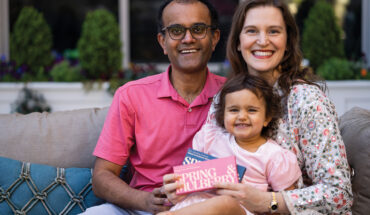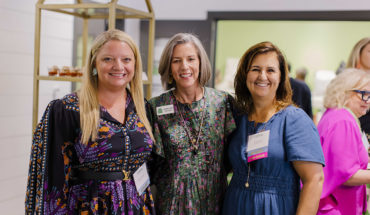Brooks Bell’s 50 under 50 initiative aims to demystify the colonoscopy to prevent colon cancer.
by Liza Roberts | photography by Eamon Queeney

Brooks Bell didn’t have time to be sick. She didn’t have time for inconvenient symptoms, she didn’t have time to call a doctor and she certainly didn’t have time to be examined. What she did have was a mandate to run the highly successful website optimization company that bore her name. She’d founded Brooks Bell Inc. 15 years earlier, built it into an industry leader and had been steering it through a stressful few months. But she’d faced worse on the job before, and she knew what she needed to do: work harder. She had meetings to run, places to go, planes to catch, people to manage. But something made the 38-year-old stop in her warp-speed tracks: blood in her stool. “Nobody wants to talk about blood in your stool,” she says. “It’s just not sexy.”
In truth, many—if not most—people in her situation, particularly at her young age, might have been embarrassed by such a symptom, found it hard to talk about or simply wished it away. They would likely have been relieved to hear what the doctor told her: The problem was simply hemorrhoids, nothing more. She was too young for graver concerns. Few people would have done what Bell did next, which was to see another doctor for a second opinion, ignore the second identical diagnosis, do her own research, decide her symptoms didn’t make sense, then cold-call a gastroenterologist to schedule a colonoscopy, pay for the procedure herself—and get it all done in just a few days. But she did. And because she did, Bell is alive today, and because she did, she wants you to know what she knows now: Colon cancer is striking people younger every year. It is deadly, invisible and, most importantly, preventable. The answer, she says, is simple: colonoscopies.
Decisions
The photo Bell saw of the tumor in her colon the day of her colonoscopy was chilling. There was a real possibility that the cancer was already at Stage Four, with a 14 percent survival rate. She and her husband, fellow technology entrepreneur Jesse Lipson, spent the next few days considering the ramifications of such a sentence. When they found out, instead, that her disease was Stage Three, with an 85 percent survival rate over five years, Bell describes herself as “euphoric.”
Euphoric, but confounded. Why had she needed to fight so hard to learn that her life was in mortal danger? What if she hadn’t been the relentless, self-advocating, intuitive, determined, data-driven person she was? What if she hadn’t been able to afford the test? And why hadn’t she known any of this to begin with?
“Great decisions begin with really great people and a simple statement: I don’t know,” says Jim Collins, the famed author of Good to Great and five other bestselling business books. “The leaders who…produced extraordinary results over time, and a series of great decisions over time…were very comfortable saying ‘I don’t know’ until they knew.”
And so it went that one of North Carolina’s most prominent young business leaders faced her questions about the things she didn’t know, got them answered and made some big decisions, even as she launched into a series of chemotherapy treatments. It was time for Brooks Bell, the business, to take a back seat. Brooks Bell, the human being, needed her.
“We came home, it was a Friday evening,” she recalls, “and we began the process of changing my life.” She and Lipson talked it through, and agreed that something drastic was in order. “I thought that to some degree, being the CEO was a contributing factor to getting cancer. Just the stress and the pressure, the constant travel I had been doing for the last few years. I was exhausted. And so I thought, I can’t continue doing this to myself. I need to focus on healing, and my company needs someone else in that role.”

It was a major decision for a person whose adult life had been defined by professional success. But it wasn’t just her own health that needed her help, Bell realized. Literally countless other people did too. They, like she, were in the dark about the risks and realities of colon cancer. One in 20 people get colon cancer, she learned. It is the third most common and second-deadliest form of cancer. Ten percent of those diagnosed are under the age of 50, and that percentage is growing faster than any other age group. The number of diagnoses in people under 35 is expected to grow 90 percent in the next decade.
“This is a kind of epidemic that is happening to young people,” Bell realized. “It’s a problem, and it is not on anyone’s radar. Some awareness is percolating, but it hasn’t hit a tipping point yet, and I just want to get us there faster.”
There was something else she learned about the disease that fired up her sense of urgency, something she found particularly astonishing: the diagnostic test that finds colon cancer—the colonoscopy itself—is also the most effective preventative measure against the disease. “It’s almost like a vaccine,” she says. “It’s the only thing that actually prevents it… You can snip out your polyps before they become cancerous. It just blew my mind.”
Within weeks, Bell had formulated her plan: she’d destigmatize the colonoscopy, tout its cancer-preventing powers, take the shame away from “talking about poop” and bring the test out of its mysterious, icky, old-people shadows. She’d get 50 local people under 50 to publicly put their names on a published list, proclaiming their pride in having been tested before the age that most insurance companies cover the cost. They’d tell their stories; they’d spread the word. By creating a new nonprofit, 50 Colonoscopies Under 50, she’d help save lives.
Bell got her first 50 names in no time. The list is now over 80 people, and is growing by the day. These people will be celebrated at “The Colonoscopy Gala” at Raleigh’s Contemporary Art Museum February 28, a “fun, shameless” fundraiser complete with “tasteful toilet humor” and awareness-raising stories, statistics and calls to action. In the meantime, Bell has completed her treatments and overhauled her life. She has taught herself to cook for the first time, and is making healthy meals. She is training for a triathlon. She is running her new nonprofit. And she says she is happier than she’s ever been.
A massive opportunity
Beyond the new lease on life, the 50 Colonoscopies Under 50 organization, and the gala, Bell has even bigger plans—which would come as no surprise to anyone who knows her. If another maxim of business strategists is that problems are opportunities in disguise, Bell has found a big one.
“I see this as a massive opportunity to have a lot of impact,” Bell says. “I want to inspire a million colonoscopies in the next decade. By helping change the conversation, by reframing this procedure as an obvious thing to do, by creating consumer awareness.”
In fact, Bell says she had been wondering for a good while how she could make an impact beyond her business, but hadn’t had the time to focus on it. It just so happens that her skills and personality are ideally suited to the task, she says: She has already built an organization from scratch, so this will be similar, even if the mission is different. “Having the background in persuasion and understanding data… it’s all very useful for this effort. It’s like major arbitrage,” she says. “To take this very serious, very big market, one that no one knows about, that I actually now have credibility in, is incredible. And it has a great stigma associated with it that I can just dive right into. It’s great. I love that. Plus, it’s perfect for my sense of humor. I just feel like I’m like handpicked to do this work.”



